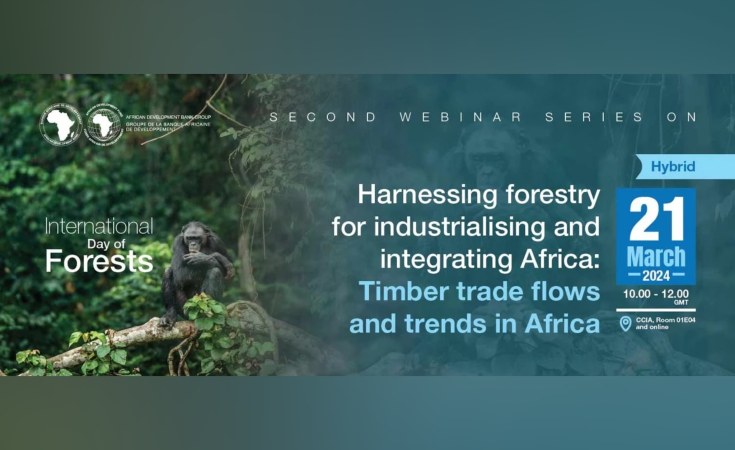Africa must work to urgently address its staggering $65 billion timber trade deficit to position forests as a critical driver for the continent's future development, global experts urge.
This deficit, accrued between 1992 and 2020, reflects the continent's imbalance between earnings from timber exports and expenditures on imports of wood-related products, they said during a panel discussion to commemorate this year's International Day of Forests on March 21.
The experts called on development partners to support investment in Africa's timber processing capacity and a continental wood marketing information system.
The discussions, titled "Forests and Innovation: New Solutions for a Better World," centered around a report released by the African Development Bank's African Natural Resources Management and Investment Centre entitled "Regional timber trade flows and trends in Africa."
The report, released in early March, established that the majority of Africa's wood products are exported unprocessed to other continents, exacerbating the continent's trade deficit. Experts emphasized the urgency of tapping into Africa's vast forest resources to drive industrialization, boost intra-African trade, enhance government revenues, and foster private sector growth.
Léontine Kanziemo, Natural Resource Management Lead Advisor at the African Development Bank, highlighted the continent's significant forest resources, including the Congo Basin, the world's second-largest tropical forest. Kanziemo stressed: "We need to look at forests from a development perspective and ensure that they are managed sustainably. It is important to remember that 25 percent of the world's population, or 1.6 billion people, depend on forests for their livelihoods."
Challenges and opportunities
Ibrahim Favada, Forest Economist and Consultant, underscored the imperative to increase intra-African trade in timber and timber products, which he noted is currently lower than 10 percent. He proposed leveraging the African Continental Free Trade Area (AfCFTA) to establish regional production centers to drive industrialization in the forestry sector.
Referencing the "Integrated and sustainable development of the timber sector in the Congo Basin" report, Youssouf Koné, Regional Integration Coordinator at the African Development Bank, stressed that adopting advanced processing solutions in Africa's vast timber industry could generate 60,000 new jobs and attract private investment.
Panelists also mentioned challenges such as corruption, informal economy dominance, and illegal logging as hindering the sector's development. Labode Popoola, Executive Secretary of the African Forestry Forum, lamented the lack of integration of smallholder activities in national policies and called for stronger links between the timber industry and global markets.
They expressed concern about the lack of tools and knowledge for measuring the volume of wood and the surface area of forests. For example, there are no tree ring-dating labs to assess carbon capture capacity. As a result, pricing does not reflect the wealth and quality of African timber.
Jean Luc Namegabe Mastaki, Director for Central Africa at the United Nations Economic Commission for Africa, said that he rued the predominance of the informal economy and illegal logging.
Recommendations
Panelists called for addressing obstacles to Africa's timber industry development, including tariff barriers, high transport costs, and travel difficulties, while highlighting the immense opportunities offered by the AfCFTA.
Jean-Guy Afrika, Acting Director of the Bank's Regional Integration Coordination Office, said that the objective of "creating a zone where goods, services, capital, and people can move freely" must be achieved. "Africa is a continent that spans 30 million km2, or three times the size of Europe, which makes integration meaningful if goods and services are to move freely", he added.
Panelists emphasized the need for roads, sea and rail links, functional customs systems, robust sectoral governance, efficient public services, capacity-building in the private sector, and investment to build human capacity.
They stressed the importance of sustainable forest management and called for a balanced approach to forest exploitation to avoid damaging ecosystems. They urged support for the establishment of a master plan for forests by the Central African Economic and Monetary Community.
Julius Chupezi Tieguhong, Chief Forestry Officer at the ANRC, moderated the panel.


